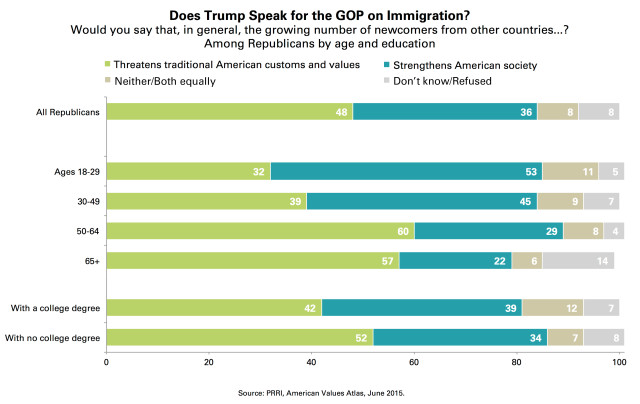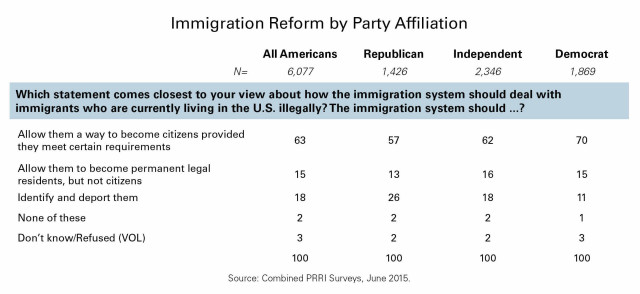At least one key factor in Trump’s dramatic rise in the polls has been his willingness to speak bluntly, and unapologetically about controversial topics, such as his controversial negative statements about Mexican immigrants. But how consistent are Trump’s sentiments about immigrants with the views of the Republicans overall, and among what segments of the Republican Party does his message most resonate?
Perceptions of immigrants’ contributions to society
Like Trump, self-identified Republicans are more likely to hold negative than positive views about recent immigrants. The June American Values Atlas survey finds that nearly half (48 percent) of Republicans say that newcomers from other countries threaten traditional American customs and values, compared to 36 percent who say they strengthen American society. In contrast, majorities of Democrats (63 percent) and independents (54 percent) believe that recent immigrants strengthen American society.
However, there are notable generational differences among Republican subgroups on this issue. Roughly six in ten (57 percent) Republican seniors (age 65 and older) say that newcomers from other countries threaten American culture, while only 22 percent say they strengthen American society. Young Republicans (age 18 to 29) hold quite different views: a majority (53 percent) say recent immigrants benefit American society and fewer than one-third (32 percent) say that immigrants present a threat to American customs and way of life.
Education levels also impact Republicans’ views about recent immigrants. A majority (52 percent) of Republicans with no college degree say that newcomers threaten traditional Americans customs and values, while about one-third (34 percent) say they strengthen American society. In comparison, Republicans with at least a college degree are nearly evenly divided: 42 percent say immigrants threaten society and 39 percent say they strengthen society.
Attitudes about immigration reform
While Trump’s negative sentiments about recent immigrants are much more likely to be shared by older Republicans and Republicans with lower levels of education, the data also suggests that his appeal may lose some of its strength as he moves from rhetoric to policy solutions. Among Republicans, for example, negative sentiments about immigrants do not translate directly into opposition to immigration reform that includes a path to citizenship.
According to the June 2015 PRRI/RNS Religion News Survey, fully six in ten (60 percent) Republicans overall say that immigrants currently living in the U.S. illegally should be allowed a way to become citizens, provided they meet certain requirements; 12 percent say they should be allowed to become permanent legal residents but not citizens, and only one-quarter (25 percent) say they should be identified and deported. Support for a path to citizenship among Republicans overall differs more in degree than in kind from other Americans. For example, support for a path to citizenship is 70 percent among Democrats and 64 percent among independents.
Even among Republican seniors and Republicans without a college degree—two subgroups who hold more negative views about recent immigrants—most support a path to citizenship. Majorities of Republican seniors (52 percent) and Republicans without a college degree (59 percent) say the immigration system should allow immigrants living in the U.S. illegally a way to become citizens if they meet certain requirements.
Potential impact of Trump’s focus on immigrants for the GOP
Trump’s emphasis on immigrants is also shining a light on an area where the GOP is at a disadvantage. Among the general public, only one-quarter (25 percent) trust the Republican Party more to handle the issue of immigration, compared to 41 percent who say they most trust the Democratic Party on the issue. Even among Republicans, one-quarter say they most trust the Democratic Party (9 percent) or neither party (16 percent) to handle the issue of immigration.
Hispanic Americans, a key target constituency for both parties in the general election, are three times as likely to say they trust the Democratic Party over the Republican Party to handle immigration issues (50 percent vs. 16 percent); however, one-third of Hispanics aren’t sold on either party.
Americans overall are more than twice as likely to say the GOP’s approach to immigration will hurt rather than help it in the upcoming election (34 percent vs. 15 percent). Still, nearly four in ten (38 percent) say the issue won’t matter one way or the other.
Democrats are much more likely to say the Republican Party’s position on immigration will hurt its electoral prospects than say it will help it (50 percent vs. 8 percent). By contrast, fewer than one in four (23 percent) Republicans believe that the party’s position on immigration will hurt its chances in the 2016 election. Nearly three in ten (28 percent) say the GOP’s approach on immigration will benefit the party’s electoral prospects, while roughly four in ten (39 percent) say it won’t make a difference.
In summary, Trump’s negative statements about immigrants seem likely to have a short-term appeal primarily to older and lower-educated Republicans. But as Trump moves from rhetoric to practical policy solutions, he risks being out of step even with these constituents. Perhaps more importantly, if Trump becomes the public face of the Republican Party on immigration, he may create a disconnect not only with independent and Hispanic voters but also with the mainstream of his own party.



